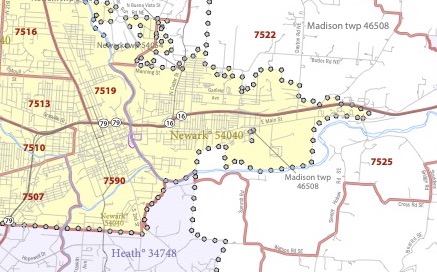Residents of two distressed neighborhoods near downtown Newark said in a recent survey that the cost of food, thefts in the area, the sale and use of illegal drugs, the cost of health care and prescription drugs, and pollution are the top priorities to address in the city’s East and South sides.
And a report released in October in Newark about the survey indicated that a large number of respondents experienced barriers to participating in public life, including voting.
The survey, conducted by the Newark Think Tank on Poverty, also explored how the arrival of the $20 billion Intel computer chip manufacturing campus less than 20 miles west of downtown Newark could affect residents of two of the city’s struggling neighborhoods.
“Of those respondents who are anticipating an impact (by the Intel factories), 27% in Licking County think the plant will hurt their households,” a report on the survey says.
Leaders of several Newark social service agencies are worried that people at the lowest income levels and those living in poverty will be affected negatively by the rapid influx of high-paying jobs for both the construction and operation of the Intel plants. Specifically, Newark Think Tank on Poverty members say that three years before the scheduled opening of Intel, they already are seeing rapid increases in housing costs, especially for renters. When the choice is between keeping a roof over their heads or going hungry, some go hungry, they said.
And if the worst occurs, and they can’t afford either food or shelter, they become homeless, and that is a growing concern in Newark, said Mallory Meeker, the organization’s marketing director.
“When you’re homeless, you’re hopeless,” she said, adding that the group and other organizations see a great need for a “low-barrier” shelter in Newark for homeless people to meet basic needs and “take baby steps to get them off the street” and restore hope.
A low-barrier shelter is one that has few restrictions about who can use it. Some shelters, for example, won’t take people who are currently using drugs or those with pets.
Removing such barriers, Meeker said, will help get more people back on their feet.
The Think Tank partnered with the Columbus-based group RuralOrganizing.org to conduct the survey of more than 330 residents in the U.S. Census tract 7590, which is downtown and South Newark, and the part of tract 7525 that is the core of the East End.
“The survey identifies the main pain points, and now we need to get the community together to work on education, action and partnership to address them,” said Al Dilorenzo, campaign manager and administrator for the survey effort, during “A Party for Change” the Think Tank held in October at the Skylight in downtown Newark.
It was a festive affair with a band, hot food and soft drinks, local artwork on display, and a lot of positive energy, even as people discussed the release of findings detailing significant concerns about life in the East and South sides.
Vickey Rice, a Think Tank organizer, said it wasn’t a big surprise that food insecurity and cost were at the top of the list.
“We don’t have something close by where people can get groceries,” she said. “We used to have the Lil’ Bear (grocery) downtown, but now, there’s nothing. Save A Lot on East Main is the closest. A lot of people are going to Circle K and the Family Dollar store, but that’s a lot of processed food.”
The report released this week said that the median annual income in the surveyed Newark neighborhoods is about $22,600, compared to about $67,700 for Licking County as a whole.
The report said that finding “shows some of the most striking differences from the county in which it is located. While the race/ethnicity makeup of the tract is nearly identical to that of the county at large, the median household income is only one-third of the median household income of the county. Similarly, while most people in the county own their homes (over 76%), only 32.3% of people in the selected census tract do.”
The survey was supported by a $50,000 grant from RuralOrganizing.org, which helps rural and small communities with research, polling, and campaigns, and was conducted from June through August, Dilorenzo said. Similar surveys were done at about the same time in Lancaster and Athens, Ohio, and the results for all three surveys were compiled in September and released in Newark in October.
The Newark Think Tank on Poverty, according to its website, was founded in 2014 and its staff and volunteers are community members in Newark and Licking County who have experienced barriers in obtaining work that provides a livable wage, safe housing, affordable health care, and accessible transportation.
Alan Miller writes for TheReportingProject.org, the nonprofit news organization of the Denison University Journalism Program, which is funded in part by the Mellon Foundation.

